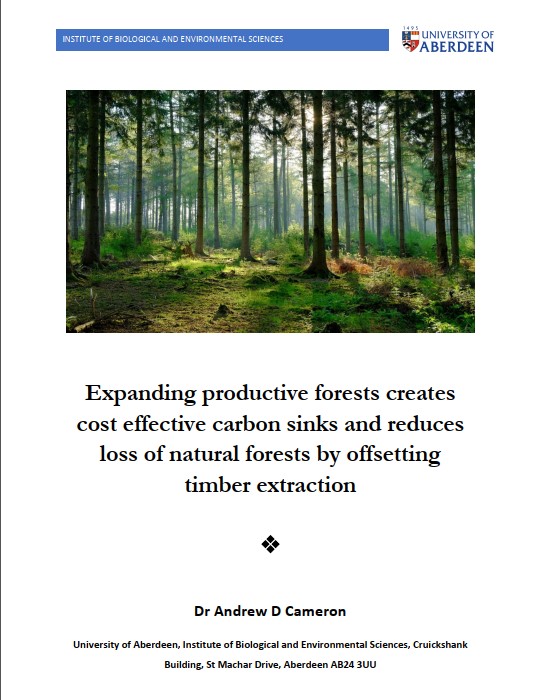Summarising his paper, Dr Cameron said: “Expansion of productive forests will offset timber production from the world’s remaining natural forests - already under extreme threat from exploitation. Also, productive forests are highly effective at sequestering atmospheric carbon, while producing an entirely renewable and sustainable material - wood.”
Many European countries that the UK relies upon for timber imports are revising down timber production forecasts due to climate-induced damage - meaning less timber available for export, reduced supply and higher prices.
Dr Cameron said the area of productive forestry had to increase significantly to tackle the timber shortfall. Just 3% of the world's total forest area is productive plantation forests, but it produces a third of global industrial timber.
Annual global industrial timber use - 6 billion cubic metres - would require 2-6 billion hectares of natural forest to achieve. Plantation forests produce far more cubic metres of timber per hectare (10-20+m3 compared to 1-3m3 from natural/semi-natural forests) - so 0.3 to 0.6 billion hectares of productive forest could meet the entire current global industrial timber use, without the need for more logging in natural forests. That would allow more of the world's remaining natural forests to be devoted to wildlife protection and habitat conservation.
Dr Cameron quoted 2021 research from Eilidh Forster of Bangor University, saying productive forests support up to 269% more greenhouse gas mitigation potential than newly-planted broadleaf conservation forests - when accounting for forest growth and wood use. He said wood use was not always considered in a full life cycle analysis of the value of wood - although it was becoming more popular in construction as it uses far less energy to produce (than, for example, cement, steel and brick) and because its thermal insulation properties were far better than alternative materials.
He concluded by saying that the UK could make a significant impact in a number of key areas by committing to major expansion of productive forests:
- significantly increase level of CO2 sequestration;
- provide a sustainable material that is growing in demand;
- reduce the carbon footprint of importing wood products over great distances;
- indirectly help reduce logging of endangered natural and semi-natural forests;
- create a domestic forest resource to enhance biodiversity, reduce flood impacts and increase opportunities for recreation;
- support fragile rural economies with jobs and growth
Ben Lake MP, Chair of the APPG, said: "The UK Government's own policies are failing to create new productive forests – undermining the UK’s ability to produce more home-grown wood.
"This is happening at a time when everyone accepts more home-grown timber is desperately needed - to support the green recovery, to decarbonise construction and increase home-grown wood supply as global prices soar and long-term demand rises rapidly."
Lord Carrington, APPG Vice-Chair, said money was crucial to increased afforestation: "Any farmer on any moderately good grade of land will not plant trees if he thinks he can do better by rewilding or putting up a solar farm. It all comes down to a financial decision.
"Information is not there about how profitable growing trees on farmland is, so farmers like me sit on our hands rather than growing trees. We would love to grow trees - but there has to be financial sense in doing it."
Baroness Young, Chair of The Woodland Trust, said forestry would be discussed in the House of Lords' new inquiry into land use.
"We're looking at everything that is a pressure on land," she said. "We have got to get multi-functional land use going - putting the right trees in right place and not ignoring production. Forestry production is a very legitimate land use."


